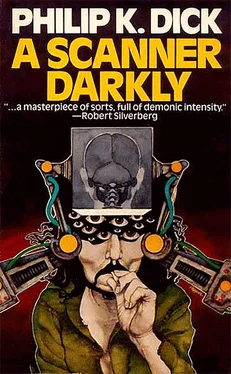“Can you tell us specific names of anyone else in this organization?” Hank said. “Persons Arctor has met with? You understand that giving false information to the legal authorities is a crime and if you do so you can and probably will be cited.”
“I understand that,” Barris said.
“Who has Arctor conferred with?” Hank said.
“A Miss Donna Hawthorne,” Barris said. “On various pretexts he goes over to her place and colludes with her regularly.”
Fred laughed. “ Colludes . What do you mean?”
“I have followed him,” Barris said, speaking slowly and distinctly, “in my own can. Without his knowledge.”
“He goes there often?” Hank said.
“Yes, sir,” Barris said. “Very often. As often as—”
“She’s his girl,” Fred said.
Barris said, “Mr. Arctor also—”
Turning to Fred, Hank said, “You think there’s any substance in this?”
“We should definitely look at his evidence,” Fred said.
“Bring in your evidence,” Hank instructed Barris. “All of it. Names we want most of all—names, license-plate numbers, phone numbers. Have you ever seen Arctor deeply involved in large amounts of drugs? More than a user’s?”
“Certainly,” Barris said.
“What types?”
“Several kinds. I have samples. I carefully took samples … for you to analyze. I can bring them in too. Quite a bit, and varied.”
Hank and Fred glanced at each other.
Barris, sightiessly gazing straight ahead, smiled.
“Is there anything else you want to say at this time?” Hank said to Barris. To Fred he said, “Maybe we should send an officer with him to get his evidence.” Meaning, To make sure he doesn’t panic and split, doesn’t try to change his mind and pull out.
“There is one thing I would like to say,” Barris said. “Mr. Arctor is an addict, addicted to Substance D, and his mind is deranged now. It has slowly become deranged over a period of time, and he is dangerous.”
“ Dangerous ,” Fred echoed.
“Yes,” Barris declared. “He is already having episodes such as occur with brain damage from Substance D. The optic chiasm must be deteriorated, since a weak ipsilateral component … But also—” Barris cleared his throat. “Deterioration, as well, in the corpus callosum.”
“This kind of unsupported speculation,” Hank said, “as I already informed you, warned you, is worthless. Anyhow, we will send an officer with you to get your evidence. All right?”
Grinning, Barris nodded. “But naturally—”
“We’ll arrange for an officer out of uniform.”
“I might—” Barris gestured. “Be murdered. Mr. Arctor, as I say—”
Hank nodded. “All right, Mr. Barris, we appreciate this, and your extreme risk, and if it works out, if your information is of significant value in obtaining a conviction in court, then naturally—”
“I’m not here for that reason,” Barris said. “The man is sick. Brain-damaged. From Substance D. The reason I am here—”
“We don’t care why you’re here,” Hank said. “We only care whether your evidence and material amount to anything. The rest is your pnoblem.”
“Thank you, sir,” Barris said, and grinned and grinned.
Back at Room 203, the police psychology testing lab, Fred listened without interest as his test results were explained to him by both the psychologists.
“You show what we regard more as a competition phenomenon than impairment. Sit down.”
“Okay,” Fred said stoically, sitting down.
“Competition,” the other psychologist said, “between the left and right hemispheres of your brain. It’s not so much a single signal, defective or contaminated; it’s more like two signals that interfere with each other by carrying conflicting information.”
“Normally,” the other psychologist explained, “a person uses the left hemisphere. The self-system or ego, or consciousness, is located there. It is dominant, because it’s in the left hemisphere always that the speech center is located; more precisely, bilateralization involves a verbal ability on valency in the left, with spatial abilities in the right. The left can be compared to a digital computer; the right to an analogic. So bilateral function is not mere duplication; both percept systems monitor and process incoming data differently. But for you, neither hemisphere is dominant and they do not act in a compensatory fashion, each to the other. One tells you one thing, the other another.”
“It’s as if you have two fuel gauges on your car,” the other man said, “and one says your tank is full and the other registers empty. They can’t both be right. They conflict. But it’s—in your case—not one functioning and one malfunctioning; it’s … Here’s what I mean. Both gauges study exactly the same amount of fuel: the same fuel, the same tank. Actually they test the same thing. You as the driver have only an indirect relationship to the fuel tank, via the gauge on, in your case, gauges. In fact, the tank could fall off entirely and you wouldn’t know until some dashboard indicator told you or finally the engine stopped. There should never be two gauges reporting conflicting information, because as soon as that happens you have no knowledge of the condition being reported on at all . This is not the same as a gauge and a backup gauge, where the backup one cuts in when the regular one fouls up.”
Fred said, “So what does this mean?”
“I’m sure you know already,” the psychologist to the left said. “You’ve been experiencing it, without knowing why or what it is.”
“The two hemispheres of my brain are competing?” Fred said.
“Yes.”
“Why?”
“Substance D. It often causes that, functionally. This is what we expected; this is what the tests confirm. Damage having taken place in the normally dominant left hemisphere, the right hemisphere is attempting to compensate for the impairment. But the twin functions do not fuse, because this is an abnormal condition the body isn’t prepared for. It should never happen. Cross-cuing , we call it. Related to splitbrain phenomena. We could perform a right hemispherectomy, but—”
“Will this go away,” Fred interrupted, “when I get off Substance D?”
“Probably,” the psychologist on the left said, nodding. “It’s a functional impairment.”
The other man said, “It may be organic damage. It may be permanent. Time’ll tell, and only after you are off Substance D for a long while. And off entirely.”
“What?” Fred said. He did not understand the answer—was it yes or no? Was he damaged forever or not? Which had they said?
“Even if it’s brain-tissue damage,” one of the psychologists said, “there are experiments going on now in the removal of small sections from each hemisphere, to abort competing gestalt-processing. They believe eventually this may cause the original hemisphere to regain dominance.”
“However, the problem there is that then the individual may only receive partial impressions—incoming sense data—for the rest of his life. Instead of two signals, he gets half a signal. Which is equally impairing, in my opinion.”
“Yes, but partial noncompeting function is better than no function, since twin competing cross-cuing amounts to zero recept form.”
“You see, Fred,” the other man said, “you no longer have—”
“I will never drop any Substance D again,” Fred said. “For the rest of my life.”
“How much are you dropping now?”
“Not much.” After an interval he said, “More, recently. Because of job stress.”
“They undoubtedly should relieve you of your assignments,” one psychologist said. “Take you off everything. You are impaired, Fred. And will be a while longer. At the very least. After that, no one can be sure. You may make a full comeback; you may not.”
Читать дальше








